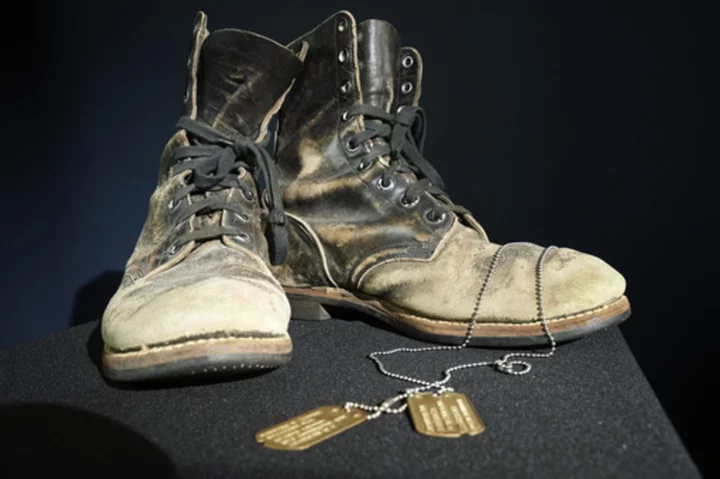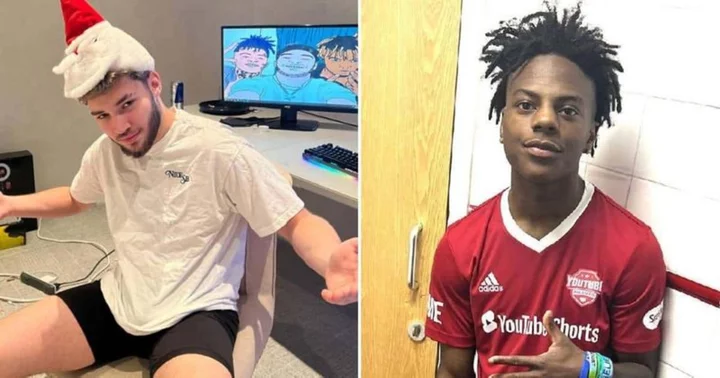DALLAS (AP) — The combat boots and dog tags that Alan Alda wore to portray the wisecracking surgeon Hawkeye on the beloved television series "M(asterisk)A(asterisk)S(asterisk)H" meant so much to him that when the show ended 40 years ago, he kept them.
But he's now ready to let the pieces go, in service of another passion: his center dedicated to helping scientists and doctors communicate better. Heritage Auctions is offering up the worn boots and military identification tags on July 28 in Dallas.
Alda, 87, said he wore the boots and dog tags for the 11-season run of the show centering on a Korean War medical unit. Alda's character, Benjamin Franklin “Hawkeye” Pierce, was a talented surgeon who helped ease the stress of working in a war zone with quick quips and practical jokes. When the show ended in 1983 with an episode written and directed by Alda, it attracted the largest U.S. audience for any TV show in history.
The boots and dog tags, given to him by the costume department, “made an impression on me every day that we shot the show,” said Alda, who won five Emmys for his work on the sitcom.
Over his long career, Alda has also been a writer and filmmaker, and has worked on Broadway and starred in movies. Currently, he hosts a podcast on communicating called “Clear+Vivid.”
“There’s an old belief among actors that when you put the shoes of the character on, it’s easier to believe you’re the character and I think the boots had that effect on me,” Alda said.
After receiving the dog tags, Alda realized that they didn’t carry his character’s name but the names of two men he thought had likely been real soldiers.
“I saw those names every day,” he said. “It was an interesting experience to put them on. I wasn’t dealing with props. I was dealing with something that put me in touch with real people.”
The dog tags carried the names of Hersie Davenport and Morriss D. Levine. Research conducted by the auction house revealed that both men were discharged from the Army in 1945. According to Heritage Auctions' research, Davenport died in 1970. Levine, whose first name was misspelled on the dog tag with an extra ‘s,’ died in 1973.
Joshua Benesh, Heritage’s chief strategy officer, said the boots and dog tags have an “incredible” provenance since they have been with Alda ever since the series ended.
“It was pretty thrilling that what he chose to keep was something that endured with him episode after episode, season after season, throughout the entire run of ‘M(asterisk)A(asterisk)S(asterisk)H,’” Benesh said.
Alda said that he kept both items on a shelf in his office, and then stowed in a closet. Auctioning them off after all of these decades made sense to him. “I saw this as a chance to put them to work again,” he said.
The money raised from the auction will go to the Alan Alda Center for Communicating Science at Stony Brook University in New York, a center he helped start to help scientists and doctors communicate better by applying improvisational exercises and communication strategies.
While hosting the long-running PBS series “Scientific American Frontiers,” Alda realized how much his skills as an actor and improviser prepared him for interactions with scientists. The essence of improvisation, he said, is being connected to the person you are talking to.
Alda, who announced in 2018 that he had Parkinson's disease, said he uses some of the same acting skills to deal with the disease's effects. The disease, he said, is “a little like improvisation: It gives you something you didn’t expect.” But, he said, “if you work on it, you get somewhere.”
“It's an opportunity. I solve a lot of puzzles and a lot of problems just getting my shirt on and that kind of thing that I wouldn’t ordinarily have to face,” Alda said. "But if I take it as a game and see how I can win it this time, it’s more interesting.”









